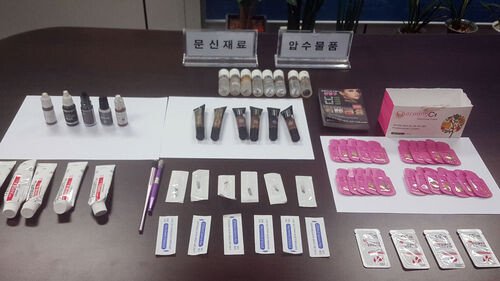
Seoul, South Korea – A recent study by the Korea Consumer Agency has revealed that a significant number of tattoo inks sold in South Korea contain harmful heavy metals and other substances. The findings have raised concerns about the safety of tattoo procedures and the need for stricter regulations.
The agency tested 24 types of tattoo ink, including those used for permanent makeup, scalp micropigmentation, and traditional tattoos. Of these, 21 (87.5%) were found to contain harmful substances such as lead, nickel, and arsenic. Seven products exceeded both domestic and international safety standards, while 13 exceeded domestic standards and one exceeded international standards.
The most concerning finding was the widespread detection of prohibited substances like nickel, lead, and arsenic in 20 out of the 24 tested products. Nickel was found in all 20 products, with levels ranging from 0.5 to 60.2 mg/kg, while lead was detected in four products and arsenic in three. Additionally, four products exceeded the permitted levels of zinc and copper.
"One particular product, a dark black brown hair line tattoo ink called 'Shinnyugungsu', was found to contain high levels of nickel, lead, arsenic, zinc, and copper," said a spokesperson for the Korea Consumer Agency. "Furthermore, two products contained the prohibited substance naphthalene, and one exceeded the permitted level of benzo[a]pyrene."
When compared to European Union (EU) safety standards, which are more comprehensive, four products were found to contain excessive levels of BIT (benzisothiazolinone), one contained MIT (methylisothiazolinone), and three contained excessive levels of 2-phenoxyethanol. The EU has a more extensive list of restricted substances for tattoo inks, including around 4,000 substances known to cause eye and skin irritation, corrosion, and eye damage.
Given that tattoo inks are injected directly into the skin, the Korea Consumer Agency emphasized the need for stricter regulations on the substances allowed in these products. The agency has recommended that the government expand the list of controlled substances in tattoo inks and strengthen oversight of the industry.
The agency has also requested that businesses involved in the import, manufacture, and sale of the affected products take immediate corrective action, including halting sales.
With an estimated 13 million people in South Korea having undergone tattoo procedures, the findings of this study have raised significant public health concerns. The Korea Consumer Agency is urging consumers to exercise caution when choosing a tattoo artist and to ensure that they use inks from reputable suppliers.
[Copyright (c) Global Economic Times. All Rights Reserved.]






























